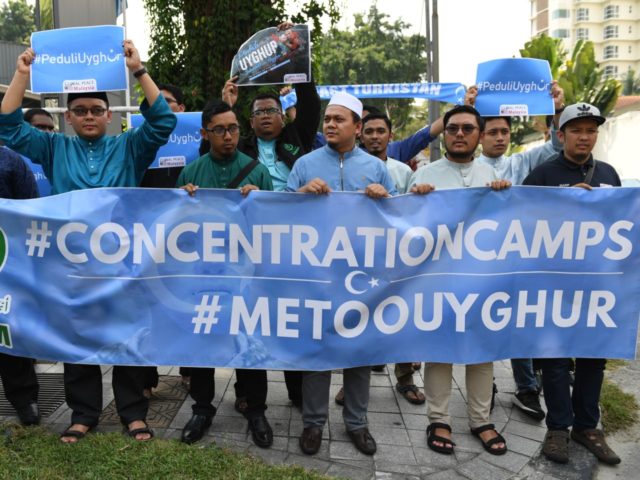China’s Foreign Ministry accused human rights activists in America of having “no conscience” for condemning Beijing’s use of concentration camps to commit genocide against Uyghur, Kazakh, and other Muslim ethnic minorities in western Xinjiang province on Wednesday.
Ministry spokesman Geng Shuang responded with outrage to remarks by American Secretary of State Mike Pompeo applauding the leak of authentic documents from the Xinjiang concentration camps, believed to total upwards of 1,000 facilities, and expressing hope that the rest of the world will now join America in demanding an end to genocidal practices by the Communist Party.
President Donald Trump’s administration has exposed human rights abuses in China and demanded an end to genocide against Uyghurs since the release of the State Department Human Rights Report for 2017. China has insisted there is no evidence for the existence of concentration camps and claimed the extensive satellite evidence of their construction actually shows “vocational training” institutions.
“Apparently, certain people in the U.S. don’t lack access for more information. They just have no conscience or courage to admit the truth,” Geng said in response to Pompeo’s remarks on Tuesday. According to the Global Times, a Chinese government propaganda outlet, Geng accused Pompeo of a “malicious attempt of using Xinjiang issues to interfere with China’s domestic affairs.”
“Some media are using despicable methods to hype China’s domestic affairs in Xinjiang and smear China’s anti-terrorism and de-radicalization efforts,” Geng claimed, referring to the publication of the Xinjiang papers this weekend. Geng referred to them as “clichés full of political bias and lies.”
The Chinese regime spokesman claimed there were “no issues related to ethnic groups, religion, or human rights in Xinjiang” and that the use of camps to involuntarily imprison, torture, and indoctrinate Muslims was necessary to “counter terrorism and extremism.”
“People in Xinjiang are living a happy life now,” Geng said.
“We will carry on implementing policies in Xinjiang as the region’s prosperity, ethnic solidarity and social harmony would be the best response to rumors on Xinjiang,” he conclunded.
The Global Times itself attacked Pompeo in a column Wednesday using nearly identical language to the official government.
“This U.S. State Secretary has been constantly peddling his clichés,” the Global Times lamented. “Radical political elites in Washington are adjusting their strategy of a public opinion war against China.”
“Pompeo and his likes have another malicious purpose: They are attempting to reduce the Chinese public’s resentment against them by shifting their attacks on China to mainly on the CPC [Chinese Communist Party],” the newspaper alleged. “They try to drive a wedge between the Chinese people and the Party, and solicit Chinese domestic endorsement for their criticism. This adjustment is undoubtedly carefully plotted, but only wishful thinking.”
The Global Times called the evidence of genocide in Xinjiang a “monstrous lie” and sang the praises of the Communist Party, claiming it “has led Chinese people to be truly independent, realize great economic growth in the past decades, fundamentally reshape people’s livelihood, and regain dignity in the world.”
“The CPC has dedicated itself to the great rejuvenation of China. This is a consensus of Chinese people, and many Westerners cannot imagine how unshakable it is,” the newspaper insisted.
Geng has spent much of the week firing back against the publication of the Xinjiang papers. On Tuesday, he dismissed the publication of the papers as a “vicious” attack on China.
“First, there are no so-called ‘issues’ related to ethnicity, religion or human rights in Xinjiang. What the Western media accuse are in fact local government’s efforts in counter-terrorism and de-radicalization,” Geng claimed. “The region now enjoys stability, ethnic solidarity and its people live a happy life. Is it certain people’s belief that residents in Xinjiang should oppose our positive measures and live in the shadows of extremism, violence and terrorism instead?”
On Wednesday, China’s national propaganda apparatus was specifically responding not to the publication of the papers, but to Pompeo’s comments at a pre-Thanksgiving press conference condemning China’s human rights abuses as exposed by those papers.
“These reports are consistent with an overwhelming and growing body of evidence that the Chinese Communist Party is committing human rights violations and abuses against individuals in mass detention,” Pompeo told reporters. “We call on the Chinese Government to immediately release all those who are arbitrarily detained and to end its draconian policies that have terrorized its own citizens in Xinjiang. It’s not just Muslims that are the largest – that are the target of the CCP’s hostility. Christians, Tibetans, and other minority groups have also felt the CCP’s heavy hand of repression.”
Unidentified sources within the Chinese government leaked what are now known as the Xinjiang papers to the International Consortium of Investigative Journalists (ICIJ), which verified them and published selections through various member media outlets. The documents reveal the construction of as many as 1,400 concentration camps and the systematic use of torture and indoctrination to eradicate Islamic beliefs, the Uyghur language, and non-Han Chinese identity from the region.
Perhaps most chillingly, the documents revealed the use of technology to “predict” which Uyghurs, Kazakhs, Kyrgyz, and other minorities in Xinjiang may pose a threat to the Communist Party. Chinese officials follow the use of online applications, monitor the speech and text of citizens to look for requests for prayer, travel abroad, or any other “irregular” activity.
Much of what is in the papers, however, was already known through the testimonies of survivors of the camps, mostly Kazakhs who appealed to their home country to escape or spouses of foreign citizens who lobbied to get them out.
Concentration camp survivors have testified to brutal beatings, gang rape, electrocution, infanticide, forced sterilization, forced abortion, signs of preparation for organ harvesting, and, of course, murder.
“Any woman or man under age 35 was raped and sexually abused,” Ruqiye Perhat, a student arrested in Xinjiang in 2009 for four years, told the Washington Post in a recent interview.

COMMENTS
Please let us know if you're having issues with commenting.